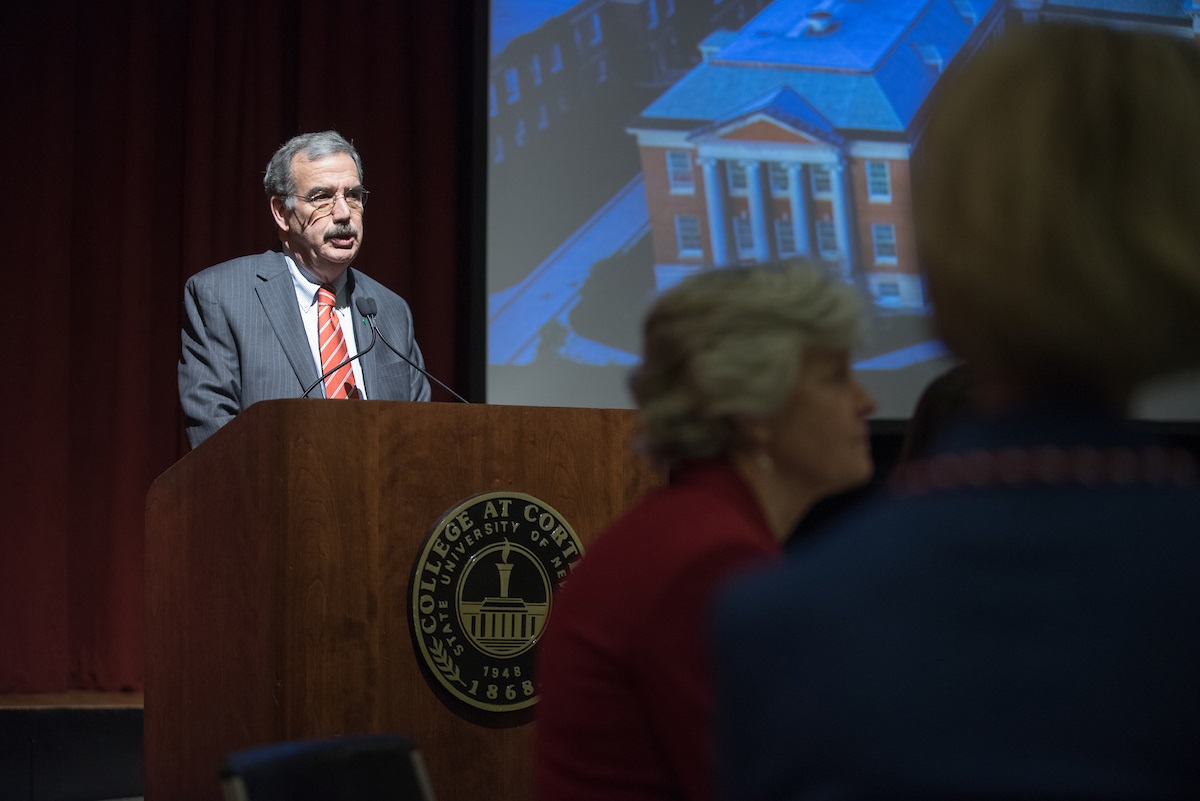
06/12/2020
The following message was sent to SUNY Cortland faculty and staff on behalf of President Erik J. Bitterbaum:
Dear Colleagues,
I am pleased to report in this update that we are making steady progress toward welcoming our faculty and staff back to the workplace and preparing for a restart of on-campus teaching in the fall. Our top priority is the health and wellbeing of all faculty, staff, students and guests to SUNY Cortland and we are committed to implementing the safety measures and protocols needed to fully reopen our campus. In undertaking this effort, the university must adhere to all local, state and federal requirements and stay current with any updates to these requirements. The Reopening New York Guidelines for Office-based Work are available here.
Today’s communication offers an overview of the planning that is taking place by various constituencies across the campus, including discussion with our union leadership, to prepare our campus for a safe return. This planning is consistent with recommendations and requirements from the Centers for Disease Control, New York State Department of Health, SUNY system and the Office of Governor Andrew Cuomo. These established guidelines are based on the best-known public health practices at the time of each phase’s reopening. As experts learn more about the virus, those guidelines frequently change, requiring our plan to be flexible and adapt to new information.
Social distancing and awareness promotion – A team is working to create template posters or signs to support social distancing, appropriate hygiene and other preventative practices. The signs are part of a larger education and communication effort that will be coordinated throughout campus. A multi-disciplinary task force is being set up to move this forward.
Public space assessment – A team is reviewing all public access locations across the university to best implement appropriate social distancing and safety measures. Spaces being reviewed include elevators, stairwells, building entrances, hallways, restroom facilities, breakrooms and vending areas. Each of these areas is being reviewed for appropriate custodial cleaning routines, density reduction, preferred direction of traffic flow, access to cleaning or hygiene supplies and necessary signage.
Office workspace assessments – Each department and divisional leader has received an office workspace assessment form requesting a review of assigned office and other non-classroom spaces to ensure social distancing of at least six feet is maintained. The form also asks leaders to identify alternate means of service delivery in order to minimize office traffic and congestion and staff interaction. Many of these workplace assessments have been completed and facilities management is working diligently to address identified structural modifications as appropriate.
Classroom-based spaces – Occupancy levels are being reviewed for all classroom and other meeting spaces. Courses will likely be delivered using a combination of online and in-person teaching. Large lecture courses will be taught completely online and classrooms will be reconfigured to accommodate social distancing during in-person instruction.
Personal protective equipment (PPE) – Appropriate protective equipment is required under the guidelines, including the wearing of masks whenever one is within six feet of another individual. The university is in the process of procuring masks and will provide all faculty and staff with one reusable/washable mask. Other acceptable face coverings include homemade cloth masks, surgical masks and face shields, which can be brought from home. Should the reusable/washable mask provided by the university be lost or left at home, each department will have single use or replacement masks available
A PPE request form has been issued to all department heads and divisional leaders to be used to procure necessary PPE, disinfectant, and cleaning supplies for routine use within office spaces. In addition to each faculty and staff having a mask, it is expected that all office spaces have hand sanitizer available for use and that cleaning supplies/disinfectant be available to supplement the cleaning activities performed by custodial services. This will be necessary for “high touch” or shared spaces such as reception areas and guest-facing desks as well as items such as computers and office supplies. Increased attention will be paid to these areas and items through routine wipe-downs during the workday or in-between users.
Self-screening process – All campus employees will be required to complete a self-screening questionnaire every day they enter their campus workspace. A self-screening app or link for this purpose is currently being developed and will be launched as soon as it is complete. The issue of guest access to the university will also be addressed in each department workplace assessment plan since guests will also be required to complete a self-screening questionnaire prior to visiting campus.
Training video – All employees will be required to view a 12-minute New York State COVID- 19 Response: Return to Work Training video before returning to the workplace. We are developing a platform for this video that will track and maintain records of viewing as well as confirmations by viewers that they understand the health and safety expectations of returning to campus.
Phased return to work – we are exploring options for phasing in the return of non-essential employees to the workplace. One possible strategy would be to begin with one-third or one-half of employees at a time and establish a rotation of employees working on campus as opposed to a group working remotely.
Flexibility to accommodate high risk and other personal needs – We are optimistic that New York’s pilot telecommuting program will be extended beyond July 17, which would allow employees to apply to work remotely during the academic year. We will also attempt to provide reasonable accommodations for those in high-risk categories or people who reside with or are required to provide care for a high-risk individual.
Once again, I thank all of you for your ongoing patience and support. I have faith in the strength and resilience of our community and know that we will all work together to fulfill SUNY Cortland’s mission in these difficult times.
Be safe, stay strong, and remain engaged.
All the best,
Erik J. Bitterbaum